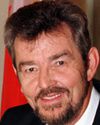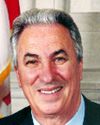moved:
That this House take note of Canada's current and future international peacekeeping commitments in this world, with particular reference to the former Yugoslavia, Haiti and Rwanda.
Madam Speaker, I want to address the House this afternoon about one of the strongest and most enduring traditions of Canadian foreign policy, our commitment to peacekeeping. Almost forty years ago, Lester B. Pearson first developed the modern concept of peacekeeping: a UN Force.
That idea defused an explosive international crisis and led to a peaceful disengagement of warring parties under the United Nations flag.
Today, I may recall that since the creation of the first United Nations Emergency Force in 1956, under the leadership of a Canadian, Lt. Gen. E.L.M. Burns, there have been 26 other UN peacekeeping missions. In every case, Canada has participated in some way. Canadians have served with distinction in all 16 peacekeeping operations currently under way in the UN.
More than 3,700 Canadians are currently deployed in eight international operations, while helping the UN secretary general with the planning of two other missions in which some 700 Canadians might eventually be called to serve. This is a unique record of achievement of which all Canadians should be proud.
A decade ago, the UN had only three active peacekeeping missions, but today, a number of important factors, including the end of the Cold War, the unfortunate outbreak of ethnic and nationalist conflict, and the new co-operation among the members of the Security Council, where veto rights are no longer used to paralyse the UN-have changed the peacekeeping equation.
The United Nations has been empowered to act where once there was a stalemate. As a result, the UN is now becoming the instrument of international co-operation which was the world community's hope in 1945. The fact that the Security Council is now using peacekeeping as a central instrument to bring about peaceful change is a development we should applaud and one we wholeheartedly support. There is no doubt that Canada is one of the UN's strongest supporters.
Next week at the United Nations, I will be putting forward suggestions for making the organization more responsive to a new era in which peacekeeping and related tasks will become even more central to its mandate.
But we have also recognized in recent months, pending the implementation of these vital reforms, that the UN has more peacekeeping mandates than it can realistically handle, involving a variety of tasks which the international community is ill-equipped to manage. It therefore seems a useful time to take stock of the situation and to ask ourselves a series of questions about peacekeeping. What are Canada's national interests in the new era of peacekeeping? How should we play a role in the more diverse and demanding era which is now confronting us? How should we deploy our very valuable resources abroad at a time of
fiscal constraint at home? How should we support the UN in a time of transition to new and more demanding tasks?
In the coming weeks, two parliamentary committees, one responsible for reviewing Canada's foreign policy and one responsible for reviewing our defence policy, will be asked to prepare a report by the end of October, and I am sure that both committees will have some very interesting recommendations to make, as they try to answer these questions.
I am also convinced that today's debate in the House will give many of us an opportunity to intervene and offer the government suggestions on the best way to answer the very fundamental questions I just formulated.
Allow me at this point in time to make a few personal comments.
My view is that peacekeeping is fundamental to Canadian foreign policy. It is not simply a question of continuing a tradition for which Canadians have a deserved international reputation. It is a question of making a concrete and key contribution to international security at a time of instability in many parts of the world. It is also a question of making the United Nations work in directions that are in Canada's interests and in the interests of virtually the entire global community.
In emphasizing the importance of peacekeeping, we have to recognize Canada's strong desire to help the UN whenever we can, but at the same time we have to acknowledge that Canada cannot be everywhere and do everything.
In my view, a number of factors should guide our future action. First of all, we should devote time, attention and resources to the planning and administrative functions at the UN which will enable the UN to function effectively in the future. This means developing ideas to make the UN secretariat more responsive to international developments, offering personnel to the UN for explicit planning functions, helping the UN plan and coordinate the initial phases of operations and, in certain cases, offering our leadership in operations, as we did in Rwanda. We had the pleasure earlier today to salute Major-General Dallaire, who was in the visitor gallery, and who so brilliantly served the UN in Rwanda.
This emphasis on the "front end", based on wide-ranging Canadian experience, will help to ensure that UN operations can function with a maximum of effectiveness. Second, Canada should focus on roles in UN missions involving what we do best. In Rwanda this has meant communications and logistics, the supply of fresh water, and the provision of medical field hospitals.
This is also what we have done with our civilian police contributions, through the Royal Canadian Mounted Police, in Namibia and the former Yugoslavia. This is what we intend to do shortly in Haiti.
Third, we should try, in thinking about our roles, to offer contributions which are not only useful in the peacekeeping phase, but which also make a contribution to the broader reconstruction of society-the "peacebuilding phase" which follows a peaceful settlement. In Kigali, for example, Canadian troops have opened the airports, and helped restore vital communications functions. In Haiti, the UN will use an international force of specially trained police officers, under the leadership of Superintendent Pouliot of the RCMP, to transform the Haitian police into a professional unit appropriate to a democratic society.
Lastly, I believe we should be open and responsive when needs arise quickly and when the international community requires an urgent response. But, to fulfil this fourth objective we will need the necessary resources. The Canadian Government and the Department of National Defence will have to plan, a bit ahead of time, to make available the human resources required to intervene, when the situation requires it, in an area of the world where our traditions or our interests might call us.
I am thinking in particular about the day when peace in the Middle East will finally have been achieved. As you know, Canada was part of the very first UN peace mission in the Middle East. Here is a part of the world where Canada can play a significant and useful role, and I am sure it will certainly be willing to help implement the peace process which seems to be taking shape and in which we are actively involved.
There are no hard and fast rules about Canadian participation. There should be no arbitrary limits to Canada's contributions. What we do in each situation must be judged in light of our interests, in light of the requirements, and in light of our ability to participate.
Resource constraints have become an obvious consideration. A decade ago our share of the total UN cost of peacekeeping was only $8 million. In this fiscal year the Canadian share will be in excess of $150 million.
Other issues need to be looked at. For example, there is the continued deployment of our peacekeepers and the capacity of other countries to participate in these types of operations. There is always value in reviewing our ongoing peacekeeping commitments.
In light of the conditions I have just outlined, the House knows that our future peacekeeping presence in the former Yugoslavia is up for renewal at the end of this month. As members will recall, last February the government held a debate on the same question. Today we are continuing this tradition. We
are looking for advice, suggestions and comments from members on both sides of the House before a final decision is reached by cabinet.
Canada has played a key role in the Balkans over the past three years. We joined the European Community monitoring mission in 1991, and committed forces to the UN protection force in the former Yugoslavia in 1992.
We are continuing the humanitarian airlift into Sarajevo in cooperation with the UN High Commissioner for refugees.
We have contributed funding to the investigation of violations of international humanitarian law and to the international tribunal for war crimes. We have some 45 RCMP officers in Bosnia to help in policing operations. Canadian Naval Forces are part of NATO's Adriatic Command. We have participated in CSCE investigative and monitoring missions, and we are about to support the monitoring of the border between the federal republic of Yugoslavia and Bosnia.
I believe we have a moral obligation to continue to help. In the field of humanitarian assistance, the Sarajevo air bridge has proven indispensable and its work will continue.
Today I am pleased to announce in addition to what we have pledged already, an additional contribution of $1 million to the International Red Cross and $7 million to be divided among four United Nations agencies: the United Nations High Commissioner for Refugees; the World Food Program; UNICEF; and the World Health Organization.
I also want to announce the extension of projects with Care Canada for the installation of water purification units in Sarajevo, and with Queen's University for developing a network of rehabilitation centres for the wounded and the handicapped. All of this is in Sarajevo. Canada will also contribute $500,000 to the special United Nations fund for the restoration of essential services in Sarajevo.
Having said that, I want the House to understand it is increasingly difficult to sustain all of these efforts. This is especially so at a time when the conflict still rages, when the parties are far from a peaceful settlement and when the prospect of lifting the arms embargo may compromise the UN's mandate and endanger all peacekeeping forces in the region.
I am happy to report that the contact group is making a significant contribution to the negotiating process, although the prospect for a settlement remains far from certain.
Canada fully expects to play a role in the diplomatic process commensurate with the size and importance of our peacekeeping contribution. We will obviously be very happy to know the views of all members of this House in regard to our involvement in the former Yugoslavia.
I believe it is possible to sustain our role in the UN protection force, at least in the short run. We need to give negotiations a chance to work. We need to ensure the provision of humanitarian assistance while political pressure takes effect.
What may prove to be necessary are adjustments in the size or disposition of Canada's contribution at a time when there are other real demands on our peacekeeping forces. Whatever changes we may need to make in the months ahead, the first priority of Canadian policy must be the conclusion of a peace agreement among the parties.
Canada is also playing a key role in the efforts of the UN and the OAS to help in the restoration of democratic government in Haiti.
I think the House will share my relief at the last minute agreement reached between the American negotiators led by former president Carter and members of the de facto military regime. We look forward to an early return of Jean-Bertrand Aristide to his rightful place as democratically-elected president of Haiti.
I understand that meetings are taking place today in Washington between Secretary Perry and President Aristide. There is a full briefing on the activities of the multinational force in Haiti, how it has been deployed, what the mandate is of this force and how it intends to facilitate the speedy and safe return of President Aristide in his country.
I have a quote by President Aristide after his briefing. He compliments President Clinton for what has taken place, saying it was as a result of his leadership. There is no doubt that the operation to unsettle the military junta was and still is a difficult task. Many people have spoken out on it but it took decisive action by the United States of America to fulfil what was considered to be the first phase of an important process in bringing back democracy in Haiti.
Some countries were ready to intervene in the first phase; some were not ready to intervene in any phase. Canada has indicated clearly from the very beginning that we would not participate in the first phase in order to be able to play a greater and more substantive role in the long run. We will participate in the second phase and work side by side with President Aristide to rebuild his country and help its population.
Canada will, of course, play a prominent role in re-building democracy in that troubled country, when the time is right. We feel confident that, in a few weeks, we will be able to deploy the contingents we promised. One of their tasks will be to train Haiti's civilian police. Canadian troops would also be part of a UN peacekeeping mission to restore stability so that President Aristide can govern his country without interference from a military junta who did not, does not and will never believe in democracy.
There is much work to be done over a period of time and we are very confident that we can do it in a reasonable amount of time in accordance with the wishes and goals of President Aristide himself.
I must say that we have no doubt that the Americans heading the multinational force in Haiti share our opinion that President Aristide must be reinstated. Never, in all the discussions I have had with American officials, have I doubted a single moment that they were as committed as we are to ensuring that democracy be restored in Haiti and that President Aristide be allowed to complete his mandate as president of his country with the full powers vested in him.
I wanted to clarify this point because my friend the Leader of the Opposition led me to believe, by certain comments and questions, that he assumed the Americans would not stand by President Aristide and would let him down. I can tell him that, as far as I am concerned, his doubts concerning the Americans are unfounded. The Clinton administration must not be imputed motives that it does not have in my view. Each within our own area of responsibility, we must believe in and support this process leading to the return of President Aristide in his country, with him being able to exercise full powers.
Allow me in closing to briefly recall the actions Canada has taken concerning Rwanda. I mentioned earlier the key role played by General Dallaire. I would like to say that, through his contribution and in many other ways, Canada has played a prominent role in restoring some peace to that country. Last May Canada called for a special session of the UN Commission on Human Rights.
Canada was also the first country to make funds available to send observers to assess the human rights situation. When the crisis escalated, Canada stood out among UN action supporters by providing substantial financial assistance to the UN mission in Rwanda, in support of General Dallaire as it were.
For a long time, we were the only country to provide air transport to the capital, Kigali, taking in food and medicine and bringing out the wounded or those in danger of dying. I say without hesitation that the Canadian effort to reinforce this UN mission helped to save thousands of lives, including that of the current Prime Minister.
We were also among the first to lend tangible support to the second element of our strategy, encouraging refugees to return to Rwanda, which we think is very important at this time. We sent a 200-person medical unit to Rwanda and we were the first to send experts to see what could be done to restore the infrastructure of the country, its water supply, electricity and telephone services.
But we must realize that this awful crisis is primarily and ultimately political. It is clear that any final agreement must have the support of all parties. That is why Canada will continue to increase its efforts in the UN mission in Rwanda and at other levels, to help stabilize the situation and prepare the ground for a peaceful settlement.
The Canadian Armed Forces may eventually be deployed in as many as ten UN operations, but even with this type of global involvement, Canada will also have the flexibility to respond rapidly in the event of humanitarian tragedies or if the conclusion of peace treaties results in a need for monitoring activities. I say these things because, again, we must consider the choices to be made. We want to make these choices after consulting Parliament, as we promised at the beginning of our mandate, after consulting the elected representatives in this Parliament who can help us forge a foreign policy that fully meets the objectives of the Canadian people and that is fully in keeping with Canada's tradition and interests.



























































